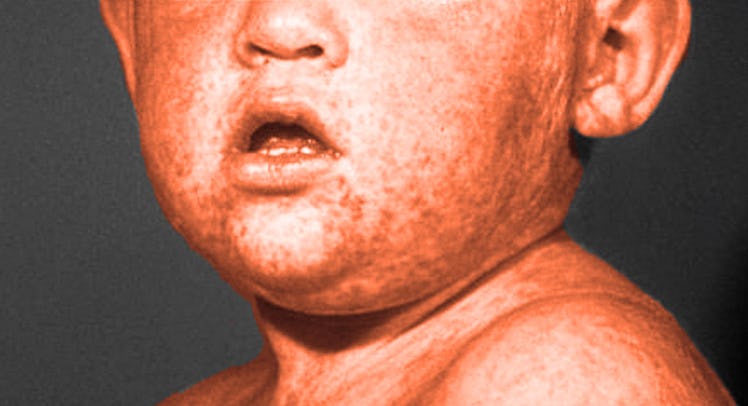How to Recognize and Treat Measles Symptoms
The chances of a child being exposed to measles and experiencing measles symptoms are vanishingly small. Still it’s good to know measles symptoms to watch out for.

The development and widespread use of the measles vaccine means that only a tiny number children in the United States will ever be exposed to measles or experience measles symptoms. But even though the Centers for Disease Control (CDC) considers measles to be eradicated in America, parents still get nervous when hearing reports about small regional outbreaks. And that’s completely understandable. After all, there are no antiviral medications to treat measles infections. That said, it may give parents peace of mind to understand what measles symptoms look like and how to act if they believe their child is infected.
“There’s been no endemic transmission of the measles from person to person in the U.S. since the year 2000,” explains Waleed Javaid, MD, Director of Infection Prevention and Control at Mount Sinai Downtown and Mount Sinai Brooklyn. “If you are born here and have your vaccinations the risk to get measles is infinitesimally small.”
Still, Javaid says, there is a very small chance that the measles vaccine can fail considering the two doses when given correctly offer 97 percent protection. It’s also important to note that babies who are not yet old enough to receive the first dose of their vaccination (around 12-months of age) rely on what known as herd immunity. Essentially, these children rely on the fact that most people in their community have been vaccinated successfully, providing a significant barrier to infection. But that barrier erodes when parents choose to not vaccinate children.
Measles Symptoms & Treatment
- The earliest measles symptoms do not include the typical patchy rash most expect.
- The first measles symptoms may include a fever, cough, and conjunctivitis.
- When the rash does appear it will be red and blotchy.
- If exposure to measles is recognized early an immune booster shot may be appropriate.
- Parents who suspect their child has contracted measles should call before visiting the doctor or ER to keep the virus from spreading.
- Treatment after diagnosis is largely supportive, there are no anti-viral drugs to fight measles.
- The best defense against measles is to ensure a child is following the appropriate vaccination schedule.
In the very rare instance a vaccine or herd immunity fails, children are most likely to contract the measles virus from an individual who has traveled into the U.S. from a country where measles is still endemic. “This most likely occurs in, for example, theme parks or other places where it’s more crowded,” explains Javaid. “But in those cases, public health officials are already tracking the situation and will reach out to the public before measles symptoms ever develop.”
Any parent who is contacted by state health officials about potential measles outbreak should then pay close attention to their child for measles symptoms. That said, the initial measles symptoms are more subtle than the patchy sore rash most might expect. Rather, those first measles symptoms include a cough and conjunctivitis, also known as pinkeye.
But if parents suspect their child is showing measles symptoms they’ll want to take a beat before running their child to the doctor. “Taking a person with possible measles may or may not be the best thing, depending on the condition of the patient,” Javaid says. “To not expose anyone, it’s better to call first if conditions are stable.”
If a child is exposed, some children may be eligible to receive post-exposure prophylaxis treatment. This treatment essentially amounts to receiving a booster shot for immunity. However, if a child has already developed symptoms and illness there are no measles treatments besides support care. “What that means is if a person requires fever control they’ll be given Tylenol. If they need help with the rash they may get a cream,” offers Javaid. “If they require respiration help the may require a respirator.”
But the fact is the chances of any child in America requiring supportive care for measles symptoms is vanishingly rare. And that is thanks to the power of the measles vaccine. The best way to fight measles then is to make sure a child is protected from contracting it in the first place.
To that end, Javaid encourages parents to be thoughtful about vaccinations. “Make sure your kid has all the vaccinations. If your kid missed a vaccination get it done. Just get it done.”